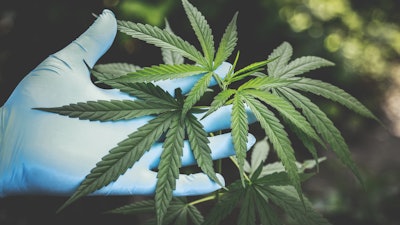
Cannabis logistics and supply chains are highly regulated environments. Cannabis businesses must implement strict controls and procedures to maintain compliance with state and federal regulations.
The cannabis industry is booming, and it's not easy to navigate the legal landscape of this expanding market. Entrepreneurs are at risk if they don't do their due diligence and stay on top of regulations––especially since some states have recently passed laws legalizing medical marijuana use. In contrast, others continue with decriminalization or even prohibition altogether.
For your company to succeed––financially and ethically––you need to do your due diligence, stay on top of the laws and gain the mentorship of those in the industry with experience. It is not worth putting your greatest asset in jeopardy simply by misunderstanding the intense compliance laws surrounding the cannabis logistics and supply chains that differ from state to state and country to country.
There are several key compliance areas to consider regarding logistics and supply chains in the cannabis industry.
Transportation
The cannabis industry is subject to various transportation laws and regulations. Cannabis businesses must comply with state and local laws, as well as any applicable federal regulations. Failure to comply with transportation laws and regulations can result in significant penalties, including fines and jail time.
Businesses within the cannabis supply chain must transport all cannabis products in secure vehicles with proper labeling and packaging. This includes ensuring that products are not mixed with other items and are kept safe and secure during transit.
Shipping internationally presents further challenges. Businesses must comply with the laws in the origin and destination countries and the laws of the countries the product will travel through. Failure to do so will likely result in severe implications.
Developments for cannabis in Europe are five to 10 years behind those in North America. Progress is happening slowly, and while some European countries have legalized the use of cannabis, others have not. This creates an interesting dynamic where countries that aren’t on board with cannabis legalization may have difficulty policing the transport of cannabis over the border from those that have legalized it.
The tracking structure for shipments moving through the international supply chain isn’t there. There is an urgent need for better systems to allow visibility across the supply chain.
Storage
Businesses must store cannabis products following state and local laws. This typically means keeping them in a locked, secure location that is not accessible to minors or unauthorized personnel.
Compliance with these regulations is essential for all businesses in the cannabis industry, as not doing so can result in penalties. For example, in Colorado, any company that fails to comply with state storage regulations faces a fine of up to $100,000.
There are various types of storage solutions available to businesses in the cannabis industry. The best solution will vary depending on the specific needs of the company. However, all storage solutions must meet the minimum state and local laws.
Track and trace
One of the most important aspects of maintaining compliance is ensuring that businesses track and trace cannabis products from seed-to-sale. Cannabis businesses must have a system to track every step of the product journey, from cultivation to retail sales. This tracking data must be accurate and up to date in order to meet regulatory requirements.
Keeping track of inventory is critical in the cannabis industry, as it helps to ensure that products are available when needed and that they are not sold to unauthorized persons. An effective tracking and tracing system can also help businesses keep track of their product quality and identify any potential issues along the supply chain. However, it is important to choose a solution that complies with all applicable laws and regulations. Some states have specific requirements for tracking and tracing systems, so businesses should be sure to select a solution that meets those requirements.
Security
There are numerous security requirements that businesses must meet to be compliant. These include having secure storage facilities, implementing security protocols and providing training for employees.
Cannabis businesses must have adequate security measures to protect their products and premises, including cameras, alarms, adequately trained security personnel and more.
Making sure your business complies with all of the necessary security regulations can be daunting. However, ensuring that your business can operate safely and effectively is essential.
Testing
In addition to tracking and tracing, another critical component of maintaining compliance is ensuring that all cannabis products are tested for quality and safety before they reach consumers. Cannabis businesses must work with accredited laboratories to test their products for harmful contaminants, such as pesticides, mold, and bacteria. Products that fail these quality tests must be destroyed and cannot be sold to consumers. There are a few different testing regulations that businesses in the industry need to know. Here are some of the most important ones:
Federal regulations. The federal government does not currently regulate the cannabis industry, which means that businesses operating in this space must be extra diligent in adhering to state and local laws.
State regulations. Depending on where a business is located, there may be different testing requirements set forth by the state government. For example, some states might require all cannabis products to be tested for potency and contaminants before becoming available for sale.
Local regulations. In addition to state laws, businesses operating in the cannabis industry must be aware of any local ordinances that might apply to them. For example, some cities and counties might have regulations regarding testing requirements for cannabis businesses.
Industry standards. While not required by law, many businesses in the cannabis industry choose to adhere to specific voluntary industry standards when it comes to testing their products. Doing so can help build consumer trust and confidence in a business's products.
Adhering to all of the relevant testing regulations can be a challenge for businesses in the cannabis industry. Still, it’s important to ensure that products are safe and compliant before they enter the market. Partner with a reputable cannabis testing laboratory that can help you ensure your products meet all applicable regulations.
Record-keeping
Maintaining accurate records is essential for any business. It is crucial in the cannabis industry due to its stringent regulations, including keeping track of sales, inventory and transactions.
One of the essential aspects of record keeping for a cannabis business is tracking product and packaging inventory. Companies must be able to account for every gram of product in their possession and its origin and destination.
Packaging materials must also be tracked, as cannabis businesses can often reuse them. Tracking helps ensure that all products are correctly labeled and that no contaminated products make it to market.
Record keeping also extends to finances. Cannabis businesses must keep detailed financial records to file taxes properly and comply with financial regulations, including maintaining records of income and expenses and any loans or investments made by the business.
By implementing strict controls and procedures throughout their logistics and supply chain operations, cannabis businesses can ensure compliance with state and federal regulations. This will help protect public health and safety while ensuring that only high-quality products reach consumers.


















